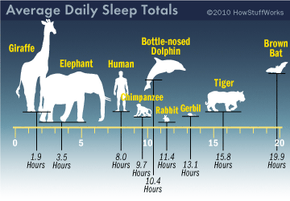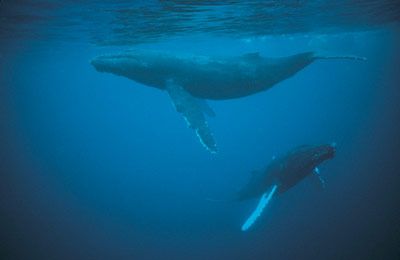Sleep might seem pretty simple, but scientists are still scratching their heads over questions surrounding this slumbering state. It's unclear exactly why organisms need to sleep, let alone whether every last species actually settles down for siestas.
Sleep itself isn't all that straightforward, so let's start by describing what's typically defined as sleep. During times of sleep, there's usually a reduction in physical activity and a decreased response to outside stimuli. Sleeping creatures often assume a customary posture -- whether that's lying down for people, hanging upside down for bats, or standing up as is sometimes the case for horses, giraffes and elephants. Sleep is also easily reversible, meaning it's a relatively simple matter to wake up, especially when compared to other states along the continuum of reduced consciousness, such as hibernation or a coma.
Advertisement
It seems most species do sleep, although differences exist between the sleeping patterns of different types of animals. Giraffes require very little sleep; they enjoy only about 30 minutes a day of deep sleep split into several separate sessions. Conversely, brown bats average close to 20 hours a day. Most mammal species need significantly more sleep when they're young, although baby orcas and baby bottlenose dolphins appear to not sleep at all during the first few months of life.
There are also examples of animals that can disrupt their normal sleeping patterns for certain special events, such as migratory birds which can survive with significantly less sleep during migratory seasons without building up any sleep debt. Some have been shown to take extremely brief power naps of just a few seconds, sometimes using unihemispheric sleep to remain semialert to their surroundings. During unihemispheric sleep, which is also practiced by some marine mammals like whales and dolphins, half the brain powers down into various sleepy-time modes, while the other half remains ready for action.
When it comes to invertebrates and other simpler forms of life, they're rarely studied with the electroencephalograms that look for telltale EEG patterns, or the brain's electrical activity, so the definition of sleep tends to focus more on behavioral cues such as physical inactivity, typical postures, regular cycles and a return to activity when roused. Fish and amphibians are among the creature types for whom it's still a little unclear whether actual sleep occurs, or if they're simply exhibiting signs that suggest a resting state. Insects, on the other hand, do set aside time to slumber.
For more articles on alluring topics like lucid dreaming and the evolution of life, visit the links on the next page.
Advertisement


